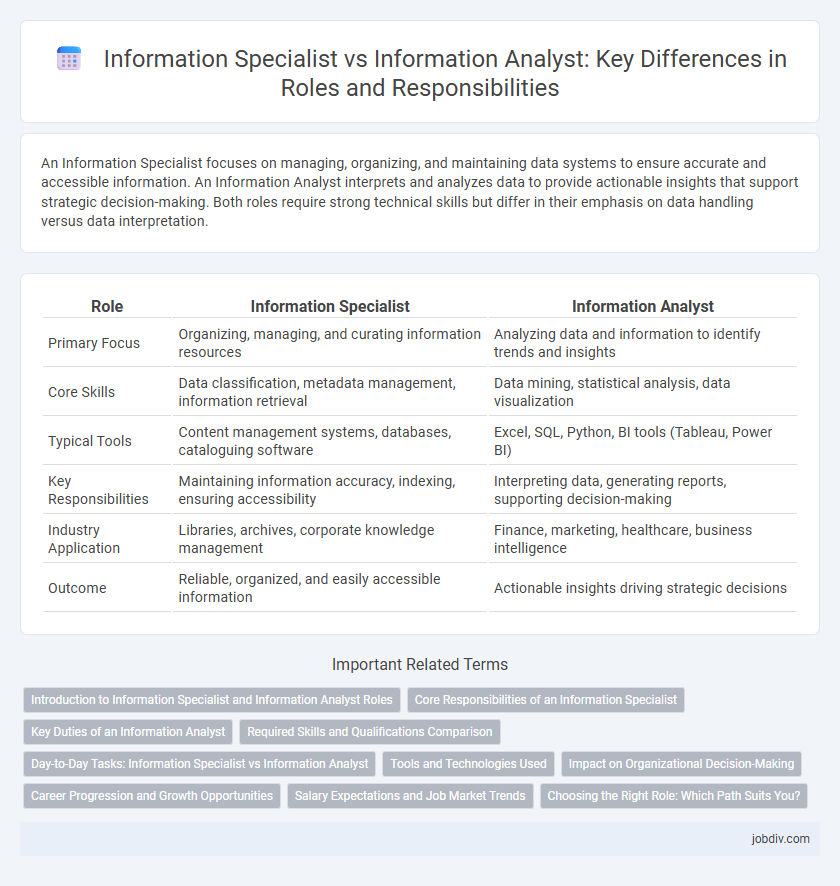An Information Specialist focuses on managing, organizing, and maintaining data systems to ensure accurate and accessible information. An Information Analyst interprets and analyzes data to provide actionable insights that support strategic decision-making. Both roles require strong technical skills but differ in their emphasis on data handling versus data interpretation.
Table of Comparison
| Role | Information Specialist | Information Analyst |
|---|---|---|
| Primary Focus | Organizing, managing, and curating information resources | Analyzing data and information to identify trends and insights |
| Core Skills | Data classification, metadata management, information retrieval | Data mining, statistical analysis, data visualization |
| Typical Tools | Content management systems, databases, cataloguing software | Excel, SQL, Python, BI tools (Tableau, Power BI) |
| Key Responsibilities | Maintaining information accuracy, indexing, ensuring accessibility | Interpreting data, generating reports, supporting decision-making |
| Industry Application | Libraries, archives, corporate knowledge management | Finance, marketing, healthcare, business intelligence |
| Outcome | Reliable, organized, and easily accessible information | Actionable insights driving strategic decisions |
Introduction to Information Specialist and Information Analyst Roles
Information Specialists manage the collection, organization, and distribution of data to ensure accessibility and accuracy within an organization. Information Analysts focus on examining and interpreting complex data sets to provide insights that support business decision-making and strategy development. Both roles are integral to effective information management but differ in their emphasis on data handling versus data analysis.
Core Responsibilities of an Information Specialist
Information Specialists focus on managing, organizing, and retrieving data to ensure it is accurate, accessible, and secure for users across various platforms. They develop and maintain information systems, curate databases, and support knowledge management initiatives, emphasizing data integrity and user support. Their core responsibilities also include facilitating information flow, conducting metadata management, and implementing information retrieval techniques tailored to organizational needs.
Key Duties of an Information Analyst
Information Analysts primarily focus on interpreting data to provide actionable insights, developing reports, and supporting strategic decision-making through data analysis techniques. They utilize statistical tools and database management systems to identify trends, patterns, and anomalies, ensuring data accuracy and relevance. Their key duties include data mining, creating data visualizations, and collaborating with stakeholders to optimize information flow and enhance business intelligence.
Required Skills and Qualifications Comparison
Information Specialists require strong expertise in data management, database technologies, and metadata standards, alongside excellent communication skills for organizing and disseminating information. Information Analysts focus on advanced analytical skills, proficiency in statistical software, and the ability to interpret complex data sets to support decision-making processes. Both roles demand a solid foundation in information technology and critical thinking, but Information Analysts emphasize data modeling and trend analysis, while Information Specialists prioritize information retrieval and cataloging techniques.
Day-to-Day Tasks: Information Specialist vs Information Analyst
Information Specialists manage data organization, cataloging, and retrieval systems to ensure accurate and efficient access to information resources. Information Analysts focus on interpreting and analyzing data trends, generating reports, and supporting decision-making processes by extracting actionable insights. Both roles require strong information management skills but differ in emphasis, with Specialists prioritizing data maintenance and Analysts emphasizing data evaluation.
Tools and Technologies Used
Information specialists utilize content management systems, digital libraries, and database software like SharePoint and Oracle to organize and retrieve data efficiently. Information analysts employ data analysis tools such as SQL, Python, Tableau, and Excel to interpret and visualize complex datasets for strategic decision-making. Both roles rely on advanced cybersecurity measures and cloud platforms like AWS or Azure to ensure data integrity and accessibility.
Impact on Organizational Decision-Making
Information Specialists organize, manage, and maintain data repositories ensuring accurate and accessible information for decision-makers, directly enhancing the efficiency of organizational workflows. Information Analysts interpret complex data sets, transforming raw data into actionable insights that guide strategic decisions and optimize business outcomes. Their complementary roles collectively strengthen data-driven decision-making processes, improving organizational responsiveness and competitive advantage.
Career Progression and Growth Opportunities
Information Specialists often focus on managing and organizing data, which serves as a foundational role that can lead to advanced positions in data governance or information management. Information Analysts use analytical tools to interpret complex datasets and provide insights, paving the way for roles in data science, business intelligence, or strategic analysis. Both careers offer growth opportunities in technology integration and decision support, with Information Analysts typically experiencing faster progression due to the high demand for advanced analytical skills.
Salary Expectations and Job Market Trends
Information Specialists typically earn a median salary ranging from $50,000 to $70,000 annually, while Information Analysts command higher salaries, often between $65,000 and $90,000, reflecting their advanced analytical skills. Job market trends indicate growing demand for Information Analysts due to increased data-driven decision-making across industries, whereas Information Specialists remain essential for managing and organizing information resources. Both roles show positive employment growth, with Information Analysts projected to grow at a faster rate, fueled by the expansion of big data and business intelligence sectors.
Choosing the Right Role: Which Path Suits You?
Information Specialists focus on managing, organizing, and maintaining data repositories to ensure accurate and accessible information. Information Analysts interpret and analyze data trends to support decision-making and strategic planning within organizations. Choose the role that aligns with your strengths in data handling versus analytical thinking and the level of interaction you prefer with data systems and business processes.
Information Specialist vs Information Analyst Infographic

 jobdiv.com
jobdiv.com